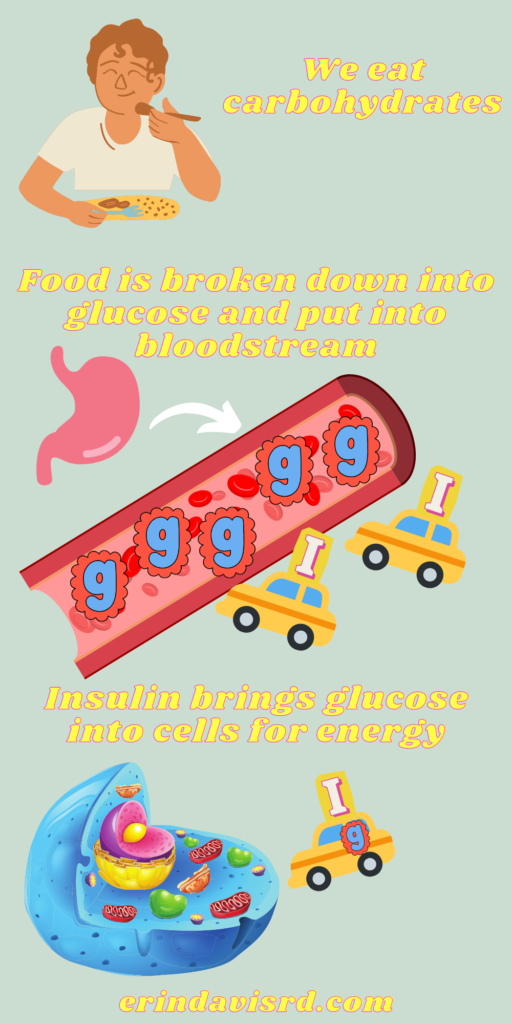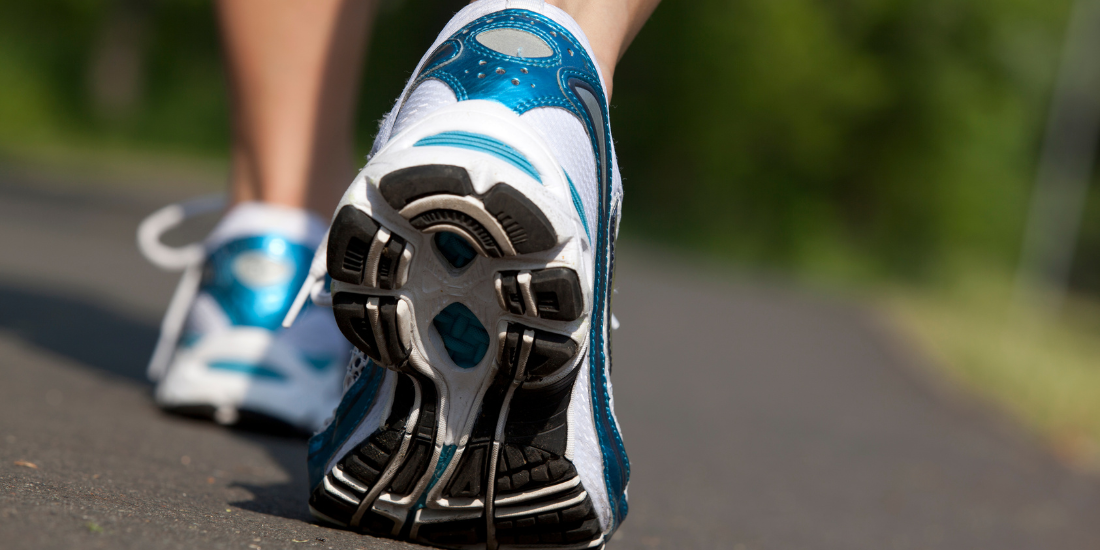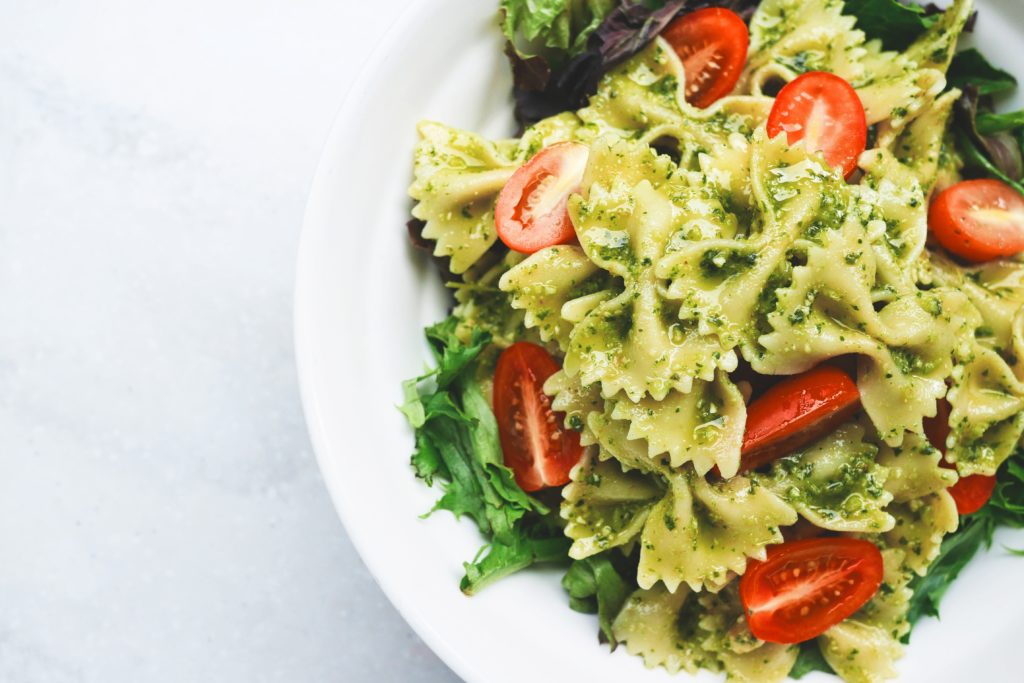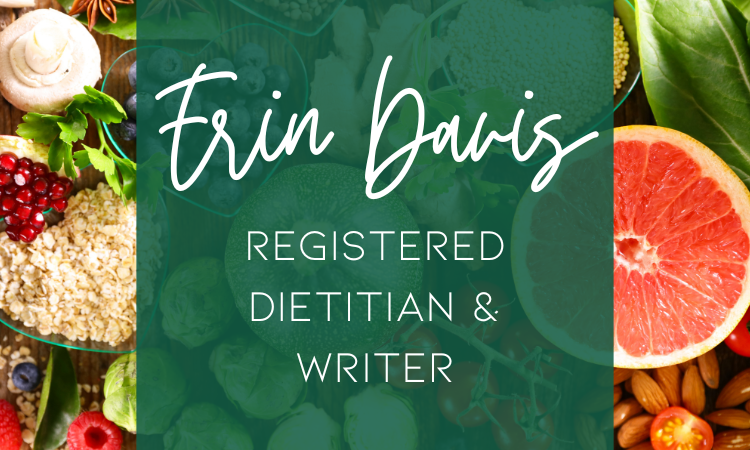Have you been told you have insulin resistance? Wondering if you need to change your diet? Are carbs bad for insulin resistance? What food for insulin resistance is best?
If you have any of those questions, you are in the right place. Insulin resistance is the body’s inability to use the insulin it makes. Insulin is the hormone that brings your blood sugars down after you eat. You eat carbs and your body needs insulin to get the sugars from your food to use for energy. What you eat does make a difference.
Of course, you want to prevent diabetes. But do you have to give up pasta, bread, rice, or ice cream? Are you doomed to a life of restriction?
If you’re new here, welcome! I’m Erin, a registered dietitian, diabetes educator, and intuitive eating counselor. In addition to being a homeschooling mom of three kids, I am a big-time research nerd! I want to ensure all of my recommendations are evidence-based rather than the latest fad.
Today, I’m explaining what insulin resistance is, how it affects your body, and what you can do about it—including what you should eat. Let’s get started!

What is insulin resistance?
Insulin resistance or impaired insulin sensitivity is when your body doesn’t use insulin as well as it should. So let’s back up and talk about what insulin is, and how it relates to glucose.
First, we eat something with carbohydrates. Carbohydrates are found in bread, pasta, tortillas, rice, oats, cereal, milk, fruit, potatoes, and sweets. Our bodies digest food in the stomach and the carbohydrates are broken down into glucose molecules.
Glucose is then added to the bloodstream (blood glucose or blood sugar). The glucose HAS to move into the cells that are located all over the body. That’s where insulin comes in.
Insulin is a hormone secreted by the pancreas to move glucose into the cells. Once in the cell, glucose is used for energy to fuel ALL of our body’s functions. I like to explain it like this: our cells need glucose and insulin is the taxi cab that transports that glucose to its destination.

When you have insulin resistance, your body makes enough insulin. In fact, your body may be making more insulin than normal. But your body doesn’t respond well to it.
It’s like you have a bunch of glucose and insulin taxi cabs clogging up the road. Think New York City rush hour. You’ve got a bloodstream (street) filled with glucose that shouldn’t be there. And you’ve got cells depending on glucose, and glucose isn’t showing up.
What causes insulin resistance?
The exact cause of insulin resistance is unknown. However, research has shown us there are certain things that put you at risk for insulin resistance.
- Obesity
- Abdominal fat
- Family history of diabetes
- Mother had gestational diabetes
What does insulin resistance do to the body?
When your body doesn’t use insulin correctly, your body responds by making more insulin. But because your body isn’t sensitive to that insulin, your blood sugar remains high.
If blood sugars remain high, you may develop prediabetes or type 2 diabetes. The extra insulin and glucose may also cause other health problems.
PCOS
Insulin resistance is associated with polycystic ovarian syndrome (PCOS). PCOS is a condition where the body produces too much androgen. And insulin resistance contributes to a further increase in androgen levels. This causes a disruption in the menstrual cycle so you may not have regular ovulation and periods. As you would expect, irregular ovulation and periods can lead to infertility.
Diabetes
Type 2 diabetes is a condition of elevated blood sugar levels. The excess glucose in your blood can lead to changes in your blood vessels, which can in turn cause complications like nerve damage, loss of vision, kidney disease, and heart disease.
Heart disease
Insulin resistance may increase stiffness in your blood vessels. The relationship is complicated, but long story short, insulin resistance is associated with heart failure. Your heart and blood vessels don’t respond well to extra glucose and insulin—and it throws everything off balance.
Fatty liver
Insulin resistance causes the pancreas to secrete more insulin. Since insulin is a storage hormone it signals your body to store blood sugar as fat. Not only can the extra insulin lead to weight gain, but it also causes excess fat to be stored in the liver. Non-alcoholic fatty liver disease (NAFLD), as its name implies, is liver damage not caused by alcohol. NAFLD is the second leading cause of liver disease requiring a liver transplant.
How to treat insulin resistance




Rather than focusing solely on restricting carbs, I prefer to take a “whole-person” approach to managing insulin resistance. Your health is SO much more than your diet. Here are ways you can improve insulin resistance.
Food for insulin resistance
While there is no one diet that is recommended for insulin resistance, we know that there are some diet patterns that are better than others. For instance, the Mediterranean diet has been shown to have multiple benefits, including reducing insulin resistance.
Reducing carbs may be the knee-jerk reaction to finding out that you are insulin resistant. However, low-carb diets are typically not sustainable long term. Think about the last time you were on a diet. How did it end? Were there cheat days? Did you uncontrollably eat high-carb/high-fat foods on the days you went off your diet? This is the experience of many of those who diet.
When eating for insulin resistance, you want consistency in your blood sugars. Restriction and binge eating is anything but consistent. Dieting often leads to food obsession and emotional eating. But you want to eat a diet that is good for your health, How do you achieve that balance?
Rather than taking all of your favorite foods out of your diet, start by adding in foods that have proven health benefits. Pay attention to your hunger and fullness cues. Eat without distraction, mindfully enjoying each bite of food. Make little swaps so you don’t feel like you are depriving yourself.
Not only does intuitive eating improve your relationship with food, but it also has been shown to have a glucose-lowering effect. Win-win. YOU DO NOT HAVE TO CUT CARBS!!! Incorporating gentle nutrition for insulin resistance will help your body become more insulin sensitive. The best food for insulin resistance includes:
- Nuts and seeds
- Olive oil
- Avocado
- Leafy greens
- Colorful fruits and vegetables
- Fish like salmon, sardines, or mackerel
- Legumes such as black beans, chickpeas, lentils

Sleep
Are you getting enough sleep? It’s recommended that you get at least 7 hours of sleep every night. I know sometimes I struggle. We tend to burn the candle at both ends with impossible to-do lists, binge-watching our favorite shows, and endless scrolling of social media.
Prioritize a good night’s rest by implementing a bedtime routine. Shut off your screens an hour before bed. Drink some herbal tea. Dim the lights. Relax your mind by reading or meditating. Limit your caffeine and alcohol intake, which can disrupt your sleep.
Stress management
We know that stress can wreak havoc on your mental health, but stress can also have a negative impact on your insulin sensitivity. Tight deadlines, financial trouble, and relationship issues may all contribute to your elevated blood sugars. Managing stress is an important part of your metabolic health.
What are your stress levels? When I work with clients, we talk about healthy ways to cope with stress. Some ideas include journaling, talking with a friend, going for a walk, being in nature, and breathing exercises.
Physical activity
Moving your body makes a huge difference in your body’s ability to use insulin. In addition to improving insulin sensitivity, exercise uses up that glucose in your blood. It’s recommended that you get 150 minutes of physical activity every week.
Getting physical activity does not mean you have to run on the treadmill every day or get an expensive gym membership. Find an activity you love so it isn’t daunting. Take some dance lessons, try karate, jump rope, kayak, rollerblade, garden, etc. If you enjoy it, you’re more likely to do it.
Another thing I should mention is motivation. Rarely am I motivated to work out. I can think of a million things that can get done instead of devoting the time to physical activity. So I have to just do it anyway. I make it a part of my regular routine, just like doing the dishes or making dinner. Those chores aren’t things I really want to do, but discipline gets them done.
On top of regular physical activity, you’ll also want to reduce sedentary time. Sitting at a computer all day for work? I know my work can make me pretty sedentary. Try to get up every hour and get some movement if possible. When you are on a call that doesn’t require video, walk while participating. Perhaps you’re ready for a standing office desk upgrade that fits a walking pad underneath.
Supplements
There are supplements that have been proven to improve insulin resistance. While each supplement has enough information to deserve a post on its own, here is a short list of some of the supplements that have been helpful in treating insulin resistance:
- Myo-inositol and D-Chiro inositol (research)
- Berberine (research)
- Cinnamon (research
- Vitamin D (research)
Medications
There are medications that are used to treat insulin resistance. Metformin is a medication often prescribed to improve insulin sensitivity. Talk with your healthcare provider about whether or not this is an option for you.
In summary, insulin resistance can lead to elevated blood glucose and insulin levels over time. Excess glucose and insulin is association with several serious health conditions. The good news: you can improve insulin sensitivity and reduce your risk for developing type 2 diabetes and heart disease.
Improving insulin resistance is much more than diet. You don’t have to give up carbs! Intuitive eating, physical activity, stress management, adequate sleep, supplements, and medications are all ways to improve insulin sensitivity.
If you need help establishing a routine or planning meals, I’m here to help. Book a free discovery call to see if my services align with your health goals.
Disclaimer: Some of the links are affiliate links, meaning I may earn a small commission should you click on the link and purchase the recommended item. Thank you for your support!
About the author
Erin is a registered dietitian and diabetes educator with almost 20 years of experience. She specializes in weight-inclusive diabetes care and prevention, intuitive eating, fitness, and women’s health. She works as a consultant and writer in the health and wellness space. Erin is passionate about empowering people to manage their own health and to have peace with food.


